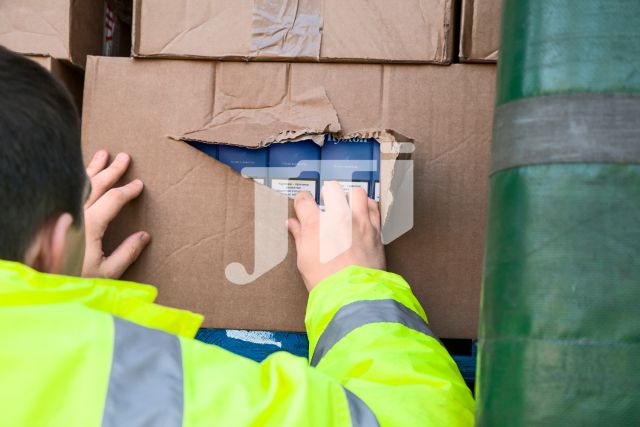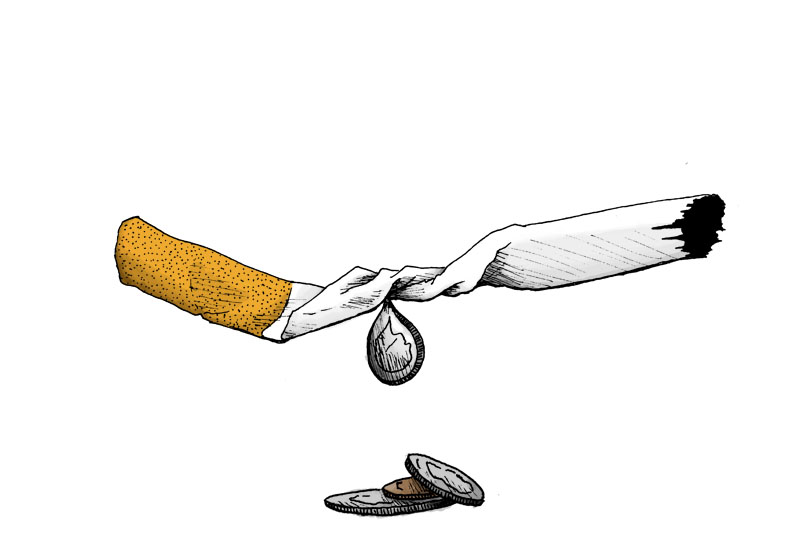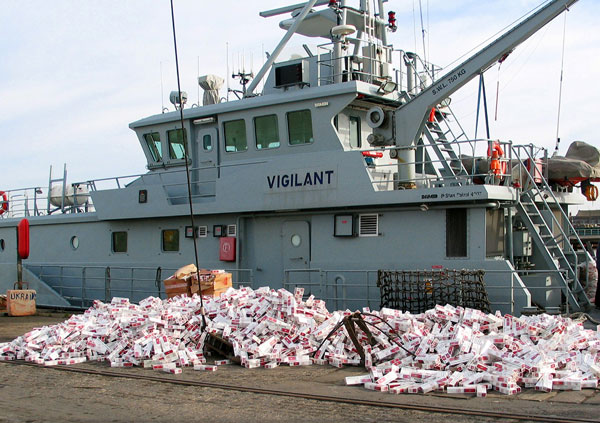The majority of shops in Kuwait are empty of cigarettes, according to a story in The Kuwait Times.
But it is not clear why this situation has come about. Some people are claiming that supplies have been cut off deliberately ahead of price rises, while others are blaming mass purchases by smokers from neighboring countries where tax-induced price rises have been imposed recently.
The times said that it had been rumored that cigarette companies in Kuwait had made ‘preparations to increase cigarette prices,’ and that certain brands of cigarettes had disappeared from markets and grocery stores.
Such disappearances had opened up a black market in the brands in question.
Despite the disappearance of some brands and the claim that the majority of shops in Kuwait were bereft of cigarettes, The Times said that the ‘prices of most brands of cigarettes have increased by 100 to 200 fils’.
Last week, the Times reported that the prices of some popular brands of cigarettes had been increased in Kuwait by as much as 60 percent despite the rises being labeled as illegal by the Ministry of Commerce and Industry.
Suppliers are apparently not allowed to increase the prices of goods unless they obtain approval from the ministry, which is usually given for imported goods, such as cigarettes, whose prices have increased in their country of origin.
If suppliers increase prices without approval, they are liable to be fined.
The Times reported this week that some smokers were complaining that cigarette traders had intentionally blocked the supply of cigarettes for the past 15 days in preparation for price rises.
Such a strategy was reportedly used before, in 2015, and at that time it provoked angry campaigns on social media. Smokers denounced cigarette shops for hoarding large quantities of cigarettes and clearing the shelves in anticipation of an official announcement to raise prices. Some sellers sold cigarettes at higher prices, as is happening again.
Some people believe that cigarette-price discussions are under way between representatives of the Ministry of Commerce and cigarette companies.
Category: Illicit Trade

Licit cigarettes vanish

Illegal trade 'prevalent'
About 4.6 billion contraband cigarettes are sold in Greece every year, ‘costing the state €600 million (US$741 million) in lost taxes,’ according to a story in the Greek Reporter quoting a conference report.
The conference was said to have involved Transparency International, the General Secretariat on Corruption, Europol, the Economic Crime Unit of the Hellenic Police (SDOE) and other organizations. There was no mention of when or where the conference took place.
According to estimated figures presented at the conference; for every container of smuggled cigarettes, about €2 million are ‘lost from taxes and duties’.
Taken together, all EU member states are estimated to ‘lose a total €11 billion every year’ to the illegal trade in tobacco.
In crisis-stricken Greece, the Greek Reporter piece said, contraband cigarettes were particularly prevalent.
It had been stressed during the conference that higher taxes and shrinking incomes had made Greece a lucrative field for international criminal rackets and Greek smugglers.
According to Greek law enforcement authorities, one in five cigarette packs on the Greek market are illicit. And Greek Customs said that about 142 million smuggled packs of cigarettes were seized in 2017.
Illicit factory raided
Authorities in the Philippines have closed a factory in Bulacan that was manufacturing fake Philip Morris and Mighty cigarettes, according to a story in The Philippine Daily Inquirer quoting the Finance Secretary Carlos G. Dominguez III.
Dominguez told reporters that with the increase in prices of cigarettes under the Tax Reform for Acceleration and Inclusion (TRAIN) Act, the government was on the lookout also for smuggled cigarettes.
“Since we raised cigarette prices, obviously there will be more incentive to smuggle, so we have to watch out,” Dominguez said.
Under the TRAIN Law or Republic Act No. 10963, the unitary excise tax imposed on cigarettes rose from P30.00 a pack to P32.50 a pack, effective January 1.
On Thursday, joint operatives of the Philippine National Police-Criminal Investigation and Detection Group and the Business Permits and Licensing Office of Guiguinto, Bulacan, raided a cigarette factory manufacturing fake cigarettes.
Initially believed to be a warehouse for illicit cigarettes, the facility was found to have a counterfeit factory at the back of the site, Dominguez said.
A Philip Morris report was said to have indicated that the inspection had resulted in the discovery of two cigarette makers, one cigarette make-pack line, hand-packing and sealing equipment, and boxes of fake tax stamps. Also discovered were boxes of filter rods, packaging materials, cut fillers, empty master cases, filter papers and other raw materials.
The authorities held one Chinese national identified as the wife of the owner of the business, and more than 70 factory workers who reportedly were all from Mindanao.
Another illicit factory was discovered in Bulacan at the end of November after it was destroyed by fire.
Tracking an export ban
A German member of the EU parliament has asked the Commission what measures it is taking to prevent its track-and-trace system creating a de facto ban on the export of tobacco products from EU countries to certain other countries.
In a preamble to three questions, Werner Langen said that on December 15, 2017, the Commission had adopted an implementing act introducing an EU-wide track-and-trace system for tobacco products.
The system was intended to cover also products manufactured for markets outside the EU, he said, before asking:
1) ‘Is the inclusion of goods for export within the scope of the track-and-trace system compatible with EU legislation, and how does the Commission therefore view the fact that, in principle, it lacks the power to regulate product specifications for markets outside the European internal market?
2) How does the Commission intend to get around the resulting de facto export ban in third countries such as Australia that, owing to strict packaging and labelling regulations, will not allow track-and-trace coding?
3) ‘What specific measures will the Commission take to prevent this de facto ban?’
Price hike due in Iran
The prices of Iranian cigarettes are due to increase by 50 percent following a parliamentary addendum to the government’s proposed budget for the next fiscal year (March 2018-19), according to a story in The Financial Tribune quoting the head of the Tobacco Planning and Supervision Center.
Ali-Asghar Ramzi said also that the price of foreign cigarettes made in Iran would rise by 10 percent.
The duty on locally- and jointly-produced Iranian cigarettes, and on products with international brand names would increase by 350 rials (US$0.76), while 500 rials would be added to the duty on imported cigarettes.
Close to 40 billion cigarettes were produced in Iran during the first 10 months of the current Iranian year, which began on March 21, 2017, up 12 percent on the output of the corresponding period of the previous year.
During the same period, cigarette imports fell by 35 percent to 2.4 billion, while cigarette exports increased by about 12 percent to 330 million.
Close to four billion cigarettes were estimated to have been smuggled into the country during the 10-month period, down 41 percent on the number smuggled in during the corresponding period of the previous year.
Iranians consumer about 55 billion cigarettes a year.
Last year, Iran produced about 45 billion cigarettes and there are plans to increase this figure to 50 billion by the end of the current year, March 20, 2018.New approach suggested
Imperial Tobacco Canada has said it believes that Health Canada can achieve the goal of reducing Canada’s smoking rate to less than five percent ahead of the target date of 2035.
It could do this, it added, by embracing the principles of harm reduction: by allowing smokers to choose alternatives to cigarettes, such as vaping and tobacco-heating products.
Imperial yesterday issued a statement to mark National Non-Smoking Week.
‘Tobacco Heating Products (THPs) and vaping products are battery-powered devices that do not use combustion to deliver nicotine, with the consumer instead inhaling vapor, not smoke,’ the statement said. ‘The vast majority of toxicants in cigarette emissions are the product of combustion, and with no combustion, the result is far fewer toxicants.
‘A report by the UK Royal College of Physicians states that because “most of the harm caused by smoking arises not from nicotine but from other components of tobacco smoke, the health and life expectancy of today’s smokers could be radically improved by encouraging as many as possible to switch to a smoke-free source of nicotine”.’
“In order to provide smokers with options between cigarettes and other alternatives – with no combustion and therefore potentially less risk – it is essential that Canada introduces regulations that can communicate their harm reduction potential,” Eric Gagnon, head of corporate and regulatory affairs, was quoted as saying. “With a reasonable and sustainable regulatory framework that supports harm reduction and next generation products, the federal government can reduce the public health impact of tobacco.”
Imperial said that the sale of nicotine-containing vaping products was currently illegal in Canada unless they had been approved by Health Canada. And since none of the products currently on the Canadian market had been approved, they were all illicit.
‘Bill S-5, which is currently before the House of Commons, seeks to legalize and introduce a regulatory framework for vaping products,’ Imperial said in its statement. ‘The Bill’s resulting regulations will have a significant impact on smokers who may choose to migrate from traditional cigarettes to smoke-free products.
‘Some governments, including that of the UK, have already taken a pragmatic approach to some of these new products and are actively providing smokers with proper information.’
“As part of the world’s largest and most international tobacco and nicotine company, we understand the complex needs of smokers, and this is why our company has invested more than US$2.5 billion since 2012 to develop a range of next generation products (NGPs) such as vapor and tobacco heating products,” said Gagnon. “It is crucial that the federal government changes its current approach toward NGPs to allow adult smokers to choose potentially less harmful products if they wish.”
Imperial said that the expiry of the Federal Tobacco Control Strategy in March 2018 would present an additional opportunity for the federal government to recognize how embracing harm-reduction principles could achieve its five percent goal, rather than adding more radical and ineffective control measures on tobacco products that only served to fuel the further growth of illicit tobacco.
“To lower the smoking rate, Canada should focus its efforts on building consumer awareness of less-risky alternatives to smoking, and crack down on the illegal tobacco industry that continues to grow and supplies more than 20 percent of the market with unregulated and untaxed cigarettes,” said Gagnon.
Illicit cigarettes lead market
Malaysia’s Royal Customs Department last year seized illicit cigarettes on which RM1 billion in taxes should have been paid, according to a story in The Malaysian Reserve.
The Department was said last year to have intensified its operations aimed at curbing the increase in illicit tobacco products in the country.
But it has a struggle on its hands. The high retail price of licit cigarettes in Malaysia makes the country a haven for smugglers and some retailers who are able to reap huge profits as smokers seek cheaper alternatives.
The government increased cigarette taxes by 110 percent during the past five years so that whereas licit brands sell for about RM17 per pack, illicit products sell for RM4-5 per pack.
An additional problem for the Department is that Malaysia’s long coastline makes monitoring the entry of illicit cigarettes difficult.
Illicit cigarettes were said last year to have taken about 57 percent of Malaysia’s 18-billion market.
The Malaysian Reserve said it was estimated that the government had lost billions in tax revenue due to the mushrooming of illicit cigarettes.
Belarus upping production
A Lithuanian member of the EU Parliament has asked whether the European External Action Service (EEAS) is going to address the issue of cigarettes manufactured in Belarus being sold in EU member states.
In a preamble to her questions, Laima Liucija Andrikienė said the government of Belarus had recently announced that a private investor would increase the manufacturing capabilities of the Grodno Tobacco factory.
According to the announcement, the increase in production was due to start in January 2018, in response to a growing demand for Belarusian cigarette brands.
The EU was among the target markets.
The MEP alleged that Belarusian cigarette brands manufactured at the Grodno factory were smuggled into more than 20 member states where they could not be legally sold.
They already represented around EUR1 billion in yearly tax losses.
Andrikienė asked:- Will the EEAS address this issue with the government of Belarus?
- Will the EEAS request information about the member state markets on which Belarusian cigarette brands can legally be sold and how the exports will be tracked to avoid ruptures in the supply chain?
- Will the EEAS point out that low taxes applied in Belarus on cigarettes are the incentive for smuggling into the EU?
The EU Commission is due to answer these questions in writing.

Tracking defended
The EU Commission has said that it has made a priority of minimising the burden of its tobacco-products tracking-and-tracing system on small and medium-sized enterprises, and ‘traditional producers’.
The Commission last week provided written answers to two questions posed by the UK member of the European Parliament, Bill Etheridge.
In a preamble to his questions, Etheridge said that with all large tobacco manufacturing plants having been closed in the UK, leaving thousands of citizens jobless, the tobacco manufacturing sector had been left to a handful of micro or small family-owned companies that were rooted in their original localities.
‘These companies rely on their ability to export the traditional tobacco products (e.g. pipe tobacco, nasal snuff, chewing tobacco) they produce and distribute,’ he said.
‘Is the Commission aware that its decision to extend the scope of “track and trace” to tobacco products destined for export:- ‘Potentially oversteps the mandate that the European Parliament has given to the Commission under the European Tobacco Products Directive (2014/40/EU)
- ‘Establishes a self-imposed trade barrier which disproportionally impacts the smaller and traditional tobacco manufacturers, ultimately driving them out of business?’
The Commission began its reply by saying that tobacco was responsible for 700,000 premature deaths in the Union every year. This made it the ‘most significant’ cause of premature death in the Union.
‘Illicit tobacco products are less likely to be in compliance with tobacco control legislation and provide artificially cheap supplies of tobacco that affect the uptake and prevalence of smoking, in particular for young people,’ the Commission said. ‘The traceability measures provided for in Article 15 of the Tobacco Products Directive (2014/40/EU) constitute a key means for combatting fraud and strengthening tobacco control in the Union.
‘The scope of the traceability measures and in particular the obligation to apply unique identifiers to all tobacco product packets manufactured in the Union is set by Article 15 of Directive 2014/40/EU. In so doing it reflects the obligations of the state parties under the World Health Organization Framework Convention on Tobacco Control’s Protocol to Eliminate Illicit Trade in Tobacco Products, which Article 15 of the Tobacco Products Directive is intended to implement in the EU. Article 8 of the Protocol requires its Parties to establish a tracking and tracing system for all tobacco products that are manufactured in or imported into’ their territory.
‘Minimising the burden of the system on small and medium-sized enterprises (SMEs) and traditional producers has been a priority for the Commission from the outset and a detailed assessment of the measures’ proportionality and expected impact in this respect was carried out. In addition, a number of lighter measures intended to reduce the burden on SMEs have been foreseen throughout the Commission’s proposals.’
Better times ahead
Volume cigarette sales in Malaysia, which began to stabilize in the third quarter of 2017, are expected to be maintained at the start of 2018, barring any market shocks, according to a story in The Edge Financial Daily quoting analysts.
In part, this stability will be underpinned by a stronger economy that is said to be delivering increased disposable incomes.
The local cigarette industry has been hit hard in recent times by the illegal trade, which has been boosted by tax-driven retail price increases on licit products.
“We think demand should improve as disposable income improves alongside economic growth,” Vincent Khoo, UOB Kay Hian’s head of research for Malaysia, was said to have told the Daily by email. “While tobacco is arguably more of a [consumer] discretionary rather than a necessity, an improved economy should trickle down to better tobacco consumption, provided there is no hike in duties or prices.”
Khoo said he believed it was unlikely that the government would raise excise-duty rates because this would lead to a fall in the government’s revenue.
Based on the finance ministry’s third-quarter 2017 report on the Malaysian economy, indirect tax collection dropped 7.3 percent to RM14.6 billion, from RM15.7 billion during the third quarter of 2016 due to excise-duty collection being down 26.4 percent, largely because of a fall in the sale of locally manufactured cigarettes.







